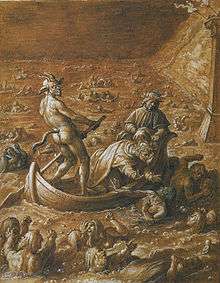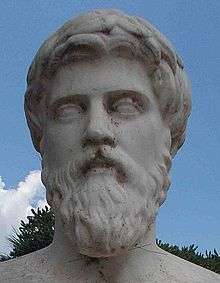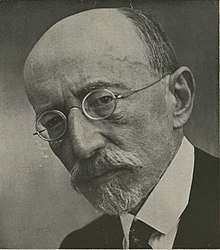- Mad redirects here. For other uses see Mad (disambiguation)


_-_NARA_-_542015_-_Restoration.jpg)


Anger also known as wrath or rage, is an intense emotional state. It involves a strong uncomfortable and hostile response to a perceived provocation, hurt or threat. Modern psychologists view anger as a primary, natural, and mature emotion experienced by virtually all humans at times, and as something that has functional value for survival. Uncontrolled anger can, however, negatively affect personal or social well-being and impact negatively on those around them.
A
- Men often make up in wrath what they want in reason.
- William R. Alger, reported in Maturin Murray Ballou, Treasury of thought: Forming an encyclopedia of quotations from Ancient and Modern Authors (1884), p. 23.
B
- Anger makes dull men witty, but it keeps them poor.
- Francis Bacon, Apophthegms (1679); first published in the Remains, No, IV (stated to have been made by Queen Elizabeth to a Sir Edward, last name not reported).
- WRATH, n. Anger of a superior quality and degree, appropriate to exalted characters and momentous occasions; as, "the wrath of God," "the day of wrath," etc. Amongst the ancients the wrath of kings was deemed sacred, for it could usually command the agency of some god for its fit manifestation, as could also that of a priest. The Greeks before Troy were so harried by Apollo that they jumped out of the frying-pan of the wrath of Cryses into the fire of the wrath of Achilles, though Agamemnon, the sole offender, was neither fried nor roasted. A similar noted immunity was that of David when he incurred the wrath of Yahveh by numbering his people, seventy thousand of whom paid the penalty with their lives. God is now Love, and a director of the census performs his work without apprehension of disaster.
- Ambrose Bierce, The Devil's Dictionary (1911).
- There is nothing like just indignation for fostering unreasoning hate.
- Christianna Brand, Green for Danger (1944), Ch. 8.1
- Iratus semper plus putat posse facere quam possit.
- The angry man always thinks he can do more than he can.
- Albertano of Brescia, Liber consolationis et consilii (1246)
- Great, strong, spiritual love — which is always at the same time a genuine, unsentimental love of man — cannot be without wrath. … Anger can no more be separated from love than flame and heat can from fire. Love and anger are a single fire of the Spirit.
- Constantin Brunner, Our Christ : The Revolt of the Mystical Genius (1921), as translated by Graham Harrison and Michael Wex, edited by A. M. Rappaport, p. 169.
- By doing this you are like a man who wants to hit another and picks up a burning ember or excrement in his hand and so first burns himself or makes himself stink.
- Buddhaghoṣa, Visuddhimagga IX, 23.
- Dangers by being despised grow great.
- Edmund Burke, speech on the Petition of the Unitarians, 1792.
- Nursing her wrath to keep it warm.
- Robert Burns, Tam o' Shanter (1793), line 12.
C
- Is it possible to understand what God's love means for the oppressed without making wrath an essential ingredient of that love? What could love possibly mean in a racist society except the righteous condemnation of everything racist? ... A God minus wrath seems to be a God who is basically not against anything.
- James Cone, A Black Theology of Liberation (1970), p. 73
- When anger rises, think of the consequences.
- Confucius, as quoted in Yu-p'u Wang The Sacred Edict: Containing Sixteen Maxims of the Emperor Kang-He (1817), p. 298.
- Heav'n has no rage, like love to hatred turn'd.
Nor Hell a fury, like a woman scorn'd.- William Congreve, The Mourning Bride.
E
- Be not hasty in thy spirit to be angry: for anger resteth in the bosom of fools.
- Ecclesiastes 7:9.
- Her wrath is a devastating flood which no one can withstand.
A great watercourse, she abases those whom she despises.
The mistress, a hurin bird who lets no one escape.
Inana, a falcon preying on the gods.- Enheduanna, A Hymn to Inana (23rd century BCE) lines 29-38.
F
- Anger is one of the sinews of the soul; he that wants it hath a maimed mind.
- Thomas Fuller, The Holy State and the Profane State (1642), book III, 8, "Anger".
G
- I have learnt through bitter experience the one supreme lesson to conserve my anger, and as heat conserved is transmuted into energy, even so our anger controlled can be transmuted into a power which can move the world.
- Mahatma Gandhi. Young India (September 15, 1920), reprinted in Collected Works of Mahatma Gandhi, Vol. 21 (electronic edition), p. 252.
H
- The Prophet ... remains always a man apart, a narrow-minded extremist, zealous for his own ideal, and intolerant of every other. And since he cannot have all that he would, he is in a perpetual state of anger and grief; he remains all his life "a man of strife and a man of contention to the whole earth." [Jeremiah 15:10] Not only this: the other members of society, those many-sided dwarfs, creatures of the general harmony, cry out after him, "The Prophet is a fool, the spiritual man is mad" [Hosea 9:7]; and they look with lofty contempt on his narrowness and extremeness.
- Ahad Ha'am, "Priest and Prophet" (1893), in Selected Essays (1904), pp. 130-131
- If people are determined to be outraged, they will be outraged.
- Daniel Hannan, "Daniel Hannan: Identity politics. It becomes impossible to avoid giving offence, because the offended keep changing the rules." (22 August 2018), Conservative Home
- Ira furor brevis est: animum rege: qui nisi paret imperat.
- Anger is momentary madness, so control your passion or it will control you.
- Horace, Epistles, I. 2. 62.
J
- Anger narrowed the vision and made for foolish choices.
- Robert Jordan, New Spring, Chapter 1: The Hook. p. 8 (January 2004)
K
- Above all he did not content himself with hurling invectives for emotional release and then to retire into smug, passive satisfaction. History had taught him it is not enough for people to be angry—the supreme task is to organize and unite people so that their anger becomes a transforming force.
- Martin Luther King, Jr., "Honoring Dr. DuBois", speech at International Cultural Evening at Carnegie Hall, 23 February 1968, published in Freedomways: A Quarterly Review of the Negro Freedom Movement, compiled in Esther Cooper Jackson (ed.), Freedomways Reader: Prophets In Their Own Country, p. 36
- Negroes will be mentally healthier if they do not suppress rage but vent it constructively and its energy peacefully but forcefully to cripple the operations of an oppressive society.
- Martin Luther King, Jr., as reported in Congressional Record of 1969, p. 14429
- When you are angry, it means you, yourself are unhappy. Even if you are wronged, you are still making yourself unhappy if you feel anger.
- Michio Kushi (1926), Spiritual Journey (1994), p. 41.
- Don’t become angry over little things: there are enough big ones.
- Donn Kushner, A Book Dragon, chapter 2
L
- Anger has been excluded from the dominant group's profile of subordinates. When one gets angry, according to Spelman, one regards the person whose conduct one assesses as one's equal. So, we can understand why anger has been excluded from the personality profile of the subordinate. In excluding anger from their personality profile, dominant groups exclude subordinates from the category of moral agents, since to be angry is to make oneself a judge and to express a standard against which one assesses the person's conduct, both of which are marks of a moral agent. In becoming angry, subordinates signal that they take themselves seriously; they believe they have the capacity as well as the right to be judges of those around them.
- Maria Lugones, Pilgrimages/Peregrinajes: Theorizing Coalition Against Multiple Oppressions (2003), p. 109
M
- From hell's heart I stab at thee; for hate's sake I spit my last breath at thee.
- Herman Melville, Moby-Dick; said by Captain Ahab to Moby-Dick.
- Do you know how you make someone into a Dalek? Subtract Love, add Anger.
- Steven Moffat, in lines written for Oswin Oswald, in Asylum of the Daleks (1 September 2012).
- Their anger in darkness turning, unreleased, unspoken, it's mouth a red wound, its eyes hungry...hungry for the moon.
- Alan Moore, Swamp Thing #40 The Curse
P
- Put away from yourselves every kind of malicious bitterness, anger, wrath, screaming, and abusive speech, as well as everything injurious.
- You husbands, keep on loving your wives and do not be bitterly angry with them.
Q
- Let there be no hostility
Except to those
Who practice oppression.- Qur'an 2:193
R
- שְׁמַע בְּנִי מוּסַר אָבִיךָ, וְאַל תִּטֹּשׁ תּוֹרַת אִמֶּךָ תִּתְנַהֵג תָּמִיד לְדַבֵּר כָּל דְּבָרֶיךָ בְּנַחַת, לְכָל אָדָם וּבְכָל עֵת, וּבַזֶּה תִּנָּצֵל מִן הַכַּעַס, שֶׁהִיא מִדָּה רָעָה לְהַחְטִיא בְּנֵי אָדָם... וְכַאֲשֶׁר תִּנָּצֵל מִן הַכַּעַס, תַּעֲלֶה עַל לִבְּךָ מִדַּת הָעֲנָוָה, שֶׁהִיא מִדָּה טוֹבָה מִכָּל מִדּוֹת טוֹבוֹת... לְמַעַן תַּצְלִיחַ בְּכָל דְּרָכֶיךָ, וְתִזְכֶּה לָעוֹלָם הַבָּא הַצָּפוּן לַצַּדִּיקִים.
- Hear, my son, the instruction of your father and don't forsake the teaching of your mother (Mishlei 1:8). Get into the habit of always speaking calmly to everyone. This will prevent you from anger, a serious character flaw which causes people to sin... Once you have distanced yourself from anger, the quality of humility will enter your heart. This radiant quality is the finest of all admirable traits... so that you will succeed in all your ways. Thus you will succeed and merit the World to Come which lies hidden away for the righteous.
- Iggeres Ha Ramban, translation by
- There are three things all wise men fear: the sea in storm, a night with no moon, and the anger of a gentle man.
- Patrick Rothfuss, The Wise Man's Fear (2011), this saying is referred to for the first time in chapter 43 of The Name of the Wind.
S
- The active hatreds rend and snarl at one another; at the bottom, the sullen hatreds lie gurgling, unable even to express themselves for the rage that chokes them.
- Dorothy L. Sayers, Hell, notes on Canto VII, pg. 114, (1949)
- Never anger made good guard for itself.
- William Shakespeare, Antony and Cleopatra (1600s), Act IV, scene 1, line 9.
- If I had a thunderbolt in mine eye,
I can tell who should down.- William Shakespeare, As You Like It (c.1599-1600), Act I, scene 2, line 226.
- Being once chaf'd, he cannot
Be rein'd again to temperance; then he speaks
What's in his heart.- William Shakespeare, Coriolanus (c. 1607-08), Act III, scene 3, line 27.
- Anger's my meat; I sup upon myself,
And so shall starve with feeding.- William Shakespeare, Coriolanus (c. 1607-08), Act IV, scene 2, line 50.
- What, drunk with choler?
- William Shakespeare, Henry IV, Part I (c. 1597), Act I, scene 3, line 129.
- Anger is like
A full-hot horse; who being allowed his way,
Self-mettle tires him.- William Shakespeare, Henry VIII (c. 1613), Act I, scene 1, line 132.
- What sudden anger's this? How have I reap'd it?
He parted frowning from me, as if ruin
Leap'd from his eyes: So looks the chafed lion
Upon the daring huntsman that has gall'd him;
Then makes him nothing.- William Shakespeare, Henry VIII (c. 1613), Act III, scene 2, line 204.
- You are yoked with a lamb,
That carries anger as the flint bears fire;
Who, much enforced, shows a hasty spark.
And straight is cold again.- William Shakespeare, Julius Cæsar (1599), Act IV, scene 3, line 109.
- Touch me with noble anger!
And let not women's weapons, water drops,
Stain my man's cheeks.- William Shakespeare, King Lear (1608), Act II, scene 4, line 279.
- The brain may devise laws for the blood; but a hot temper leaps o'er a cold decree: such a hare is madness the youth, to skip o'er the meshes of good counsel, the cripple.
- William Shakespeare, The Merchant of Venice (late 1590s), Act I, scene 2, line 19.
- It engenders choler, planteth anger;
And better 'twere that both of us did fast,
Since, of ourselves, ourselves are choleric,
Than feed it with such over-roasted flesh.- William Shakespeare, The Taming of the Shrew (c. 1593-94), Act IV, scene 1, line 175.
- Come not within the measure of my wrath.
- William Shakespeare, The Two Gentlemen of Verona (1590s), Act V, scene 4, line 127.
- A mild answer turns away rage, but a harsh word stirs up anger.
- The insight of a man certainly slows down his anger, and it is beauty on his part to pass over transgression.
- A man prone to anger stirs up strife; anyone disposed to rage commits many transgressions.
- Since, Zoilus, you rage like a mad dog, and dart out your viper's tongue against everybody, and can never be quiet, and are always swelling like the frog, I wonder you too don't burst.
- Phillip Stubbes, Phillippus Stubeus, Anatomy of Abuse ( 1583) Gloss.
- A man raising his hand in anger does not see clearly.
T
- Senseless, and deformed,
Convulsive Anger storms at large; or pale,
And silent, settles into fell revenge.- James Thomson, The Seasons, Spring (1728), line 28.
- Once you have identified with some form of negativity, you do not want to let go, and on a deeply unconscious level, you do not want positive change. It would threaten your identity as a depressed, angry, or hard-done-by person. You will then ignore, deny or sabotage the positive in your life. This is a common phenomenon. It is also insane.
- Eckhart Tolle in The Power of Now: A Guide to Spiritual Enlightenment (1997) p. 119
- All inner resistance is experienced as negativity in one form or another. All negativity is resistance. In this context, the two words are almost synonymous. Negativity ranges from irritation or impatience to fierce anger, from a depressed mood or sullen resentment to suicidal despair. Sometimes the resistance triggers the emotional pain-body, in which case even a minor situation may produce intense negativity, such as anger, depression, or deep grief. The ego believes that through negativity it can manipulate reality and get what it wants. It believes that through it, it can attract a desirable condition or dissolve an undesirable one.
- Eckhart Tolle in The Power of Now: A Guide to Spiritual Enlightenment (1997) p. 119
- There are things that must evoke our anger to show we care. It is what we do with that anger. If we direct that energy we can use it positively or destructively.
- Archbishop Desmond Tutu, Daily Express, 29th October 2008.
X
- Usually, when people are sad, they don’t do anything. They just cry over their condition. But when they get angry, they bring about a change.
- Malcolm X, Malcolm X Speaks (1965), p. 107.
Hoyt's New Cyclopedia Of Practical Quotations
- Quotes reported in Hoyt's New Cyclopedia Of Practical Quotations (1922), p. 27-28.
- I was angry with my friend:
I told my wrath, my wrath did end.
I was angry with my foe;
I told it not, my wrath did grow.- William Blake, Christian Forbearance.
- Alas! they had been friends in youth;
But whispering tongues can poison truth,
And constancy lives in realms above;
And life is thorny, and youth is vain;
And to be wrothe with one we love
Doth work like madness in the brain.- Samuel Taylor Coleridge, Christabel (c. 1797-1801, published 1816), Part II.
- Beware the fury of a patient man.
- John Dryden, Absalom and Achitophel (1681), Part I, line 1005.
- A man deep-wounded may feel too much pain
To feel much anger.- George Eliot, The Spanish Gypsy (1868), Book I.
- Anger seeks its prey,—
Something to tear with sharp-edged tooth and claw,
Likes not to go off hungry, leaving Love
To feast on milk and honeycomb at will.- George Eliot, The Spanish Gypsy (1868), Book I.
- Be ye angry, and sin not: let not the sun go down upon your wrath.
- Ephesians, IV. 26.
- Craignez la colère de la colombe.
- Beware the anger of the dove.
- French Proverb. See Quitard's Dictionary of Proverbs.
- Anger, which, far sweeter than trickling drops of honey, rises in the bosom of a man like smoke.
- Homer, The Iliad, XVIII, 108.
- Fœnum habet in cornu.
- He has hay on his horns.
- Horace, Satires, I. 4. 34.
- Trahit ipse furoris
Impetus, et visum est lenti quæsisse nocentem.- They are borne along by the violence of their rage, and think it is a waste of time to ask who are guilty.
- Marcus Annaeus Lucanus, Pharsalia, II, 109.
- Nemo me impune lacessit.
- No man provokes me with impunity.
- Motto of the Order of the Thistle.
- Quamlibet infirmas adjuvat ira manus.
- Anger assists hands however weak.
- Ovid, Amorum (16 BC), I. 7. 66.
- Ut fragilis glacies interit ira mora.
- Like fragile ice anger passes away in time.
- Ovid, Ars Amatoria, I. 374.
- Fear not the anger of the wise to raise;
Those best can bear reproof who merit praise.- Alexander Pope, An Essay on Criticism (1709), line 582.
- He that is slow to anger is better than the mighty; and he that ruleth his spirit than he that taketh a city.
- Proverbs, XVI. 32.
- Anger wishes that all mankind had only one neck; love, that it had only one heart; grief, two tear-glands; and pride, two bent knees.
- Jean Paul Richter, Flower, Fruit and Thorn Pieces, Chapter VI.
- Dem tauben Grimm, der keinen Führer hört.
- Deaf rage that hears no leader.
- Friedrich Schiller, Wallenstein's Tod, III. 20. 16.
- No pale gradations quench his ray,
No twilight dews his wrath allay.- Walter Scott, Rokeby, Canto VI, Stanza 21.
- Quamvis tegatur proditur vultu furor.
- Anger, though concealed, is betrayed by the countenance.
- Seneca the Younger, Hippolytus, CCCLXIII.
- Ne frena animo permitte calenti;
Da spatium, tenuemque moram; male cuncta ministrat
Impetus.- Give not reins to your inflamed passions; take time and a little delay; impetuosity manages all things badly.
- Statius, Thebais, X, 703.
- Not die here in a rage, like a poisoned rat in a hole.
- Jonathan Swift, letter to Bolingbroke, March 21, 1729.
- Furor fit læsa sæpius patientia.
- Patience provoked often turns to fury.
- Syrus, Maxims, 178.
Dictionary of Burning Words of Brilliant Writers (1895)
- Quotes reported in Josiah Hotchkiss Gilbert, Dictionary of Burning Words of Brilliant Writers (1895), p. 13-14.
- The sun should not set upon our anger, neither should he rise upon our confidence.
- The proud man hath no God; the envious man hath no neighbor; the angry man hath not himself.
- He submits himself to be seen through a microscope, who suffers himself to be caught in a fit of passion.
- There was a man here last night — you needn't be afraid that I shall mention his name — who said that his will was given up to God, and who got mad because the omnibus was full, and he had to walk a mile to his lodgings.
- When I had twice or thrice made a resolute resistance to anger, the like befell me that did the Thebans; who, having once foiled the Lacedemonians, never after lost so much as one battle which they fought against them.
- An unsanctified temper is a fruitful source of error, and a mighty impediment to truth.
- Our passions are like convulsion fits, which make us stronger for the time, but leave us weaker forever after.
- If anger proceeds from a great cause, it turns to fury; if from a small cause, it is peevishness; and so is always either terrible or ridiculous.
See also
External links
Emotions
Adoration ~ Affection ~ Agony ~ Amusement ~ Anger ~ Anguish ~ Anxiety ~ Apathy ~ Awe ~ Boredom ~ Calmness ~ Cheerfulness ~ Compassion ~ Contempt ~ Contentment ~ Depression ~ Desire ~ Disappointment ~ Discontent ~ Disgust ~ Ecstasy ~ Embarrassment ~ Empathy ~ Enthusiasm ~ Envy ~ Euphoria ~ Fear ~ Gratitude ~ Grief ~ Guilt ~ Happiness ~ Hatred ~ Hope ~ Hostility ~ Humiliation ~ Impatience ~ Indignation ~ Insecurity ~ Jealousy ~ Joy ~ Loneliness ~ Loss ~ Love ~ Lust ~ Malice ~ Melancholy ~ Nostalgia ~ Panic ~ Passion ~ Pity ~ Pride ~ Rage ~ Regret ~ Remorse ~ Resentment ~ Sadness ~ Shame ~ Sorrow ~ Suffering ~ Surprise ~ Sympathy ~ Wonder ~ Worry